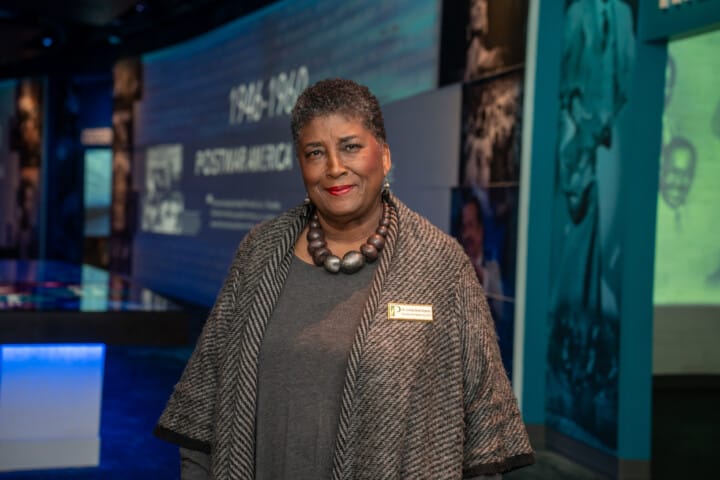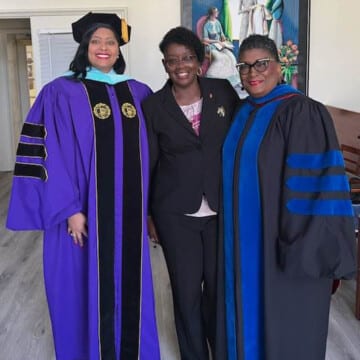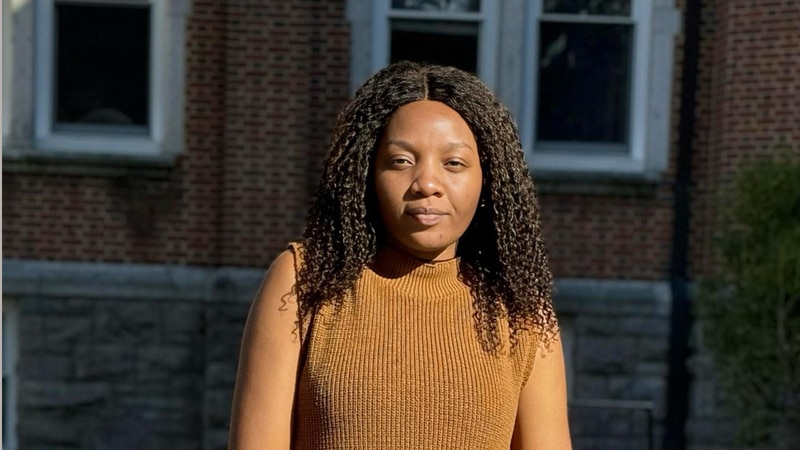UMC Support Shaped Dr. Bond Hopson’s Legacy of Higher Education Leadership

Dr. Cynthia Bond Hopson retired in June after 20 years with the Black College Fund and the General Board of Higher Education and Ministry.
September 22 | By Wendy R. Cromwell
NASHVILLE, Tenn. — When she started college at age 26, Dr. Cynthia Bond Hopson didn’t know where the road would lead. However, for this lifelong United Methodist, the church’s support — through scholarships, prayers and people — turned dreams into a legacy of leadership in higher education.
“I was praying for discernment about my future,” she said. “The day I received a $750 leadership development grant from the General Board of Global Ministries (GBGM) — though I hadn’t led anybody anywhere for any reason — it was affirmation. I was on the right path.”
Dr. Bond Hopson earned three degrees, including a doctorate, thanks to sustained United Methodist support from the General Board of Higher Education and Ministry (GBHEM) and other church agencies. She received tuition assistance, loans, fellowships and scholarships and often came home to cards and small gifts from United Methodist women she had never met.
“Those gentle reminders kept me going for the seven years, nine months, and 21 days it took to finish,” she said. “The United Methodist Church invested in me at every level.”
Dr. Bond Hopson paid it forward with 20 years of service at GBHEM, including three as chief equity officer, where she led the creation of WIDEA — an initiative centered on worldwide inclusion, diversity, equity and access — and the Black College Fund (BCF), the United Methodist fund supporting 11 Historically Black Colleges and Universities.
“I was given an opportunity to create something transformative with care and intentionality,” Dr. Bond Hopson said. “It was a full-circle moment. This church helped shape me. Now I could help shape the church.”
“Cynthia’s educational journey exemplifies the church’s commitment to supporting students and Historically Black Colleges and Universities through the Black College Fund,” said Roland Fernandes, general secretary of the General Board of Higher Education and Ministry. “She approached her role at GBHEM with quiet humility and offered a powerful, unwavering voice on diversity.”

Dr. Crystal Banks (from left), Bishop Delores J. Williamston from the Louisiana Conference, and Dr. Cynthia Bond Hopson at a Black College Fund event.
Former president of Bethune-Cookman University, Dr. Trudie Reed said Dr. Bond Hopson embraced the ministry of education. “She would respond, make you feel as though your challenge was the most important thing in the world. Dr. Bond Hopson is a radiant life from God who lives out the ministry of the gospel through her service.”
“She’s just a phenomenal leader and an amazing person,” said the Rev. Dr. Albert Mosley, the new president at Bethune-Cookman. “She certainly left her imprint on all 11 of our historically black colleges, and more than that, she has mentored a generation of leaders.”
Her tenure also included service as interim president of Philander Smith University, a Black College Fund supported United Methodist-related HBCU. She stepped into the role in the wake of personal loss after the death of her husband, the Rev. Roger A. Hopson, and institutional challenges.
“One of my first calls at Claflin University was from Dr. Bond Hopson,” Dr. Dwaun J. Warmack said, adding later when Dr. Bond-Hopson was appointed interim president, it came full circle. “‘Now I’m calling you, just to ask for a little bit of guidance, sir,’ her humbleness and understanding of what that meant. I oftentimes will call her the glue that was able to keep it together.”
Dr. Bond Hopson described her role as healing the Philander Smith campus and loving the people. In just over a year, she raised $3 million, launched student engagement programs and provided raises to the lowest-paid staff. The Black College Fund provided her second-largest source of funding. “Church support is not just financial – it’s transformational,” said Dr. Bond Hopson.
“Cynthia is a joy and delight,” said Dr. George T. French Jr., president of Clark-Atlanta University. “She understood the complexity of being an HBCU president and was able to prioritize participation in the Black College Fund for us.”
Now retired, Dr. Bond Hopson is writing, mentoring and giving thanks. “The United Methodist Church poured into me,” she said. “I hope I’ve made the church proud.”
Related Posts
For Priscille Hassa Malandji, a Master of Divinity student at Drew University Theological School, receiving a 2025-2026 General Board of Higher Education and Ministry (GBHEM) scholarship has been more than financial relief — it’s a confirmation of her calling.
What begins on Ash Wednesday culminates with Good Friday. This period is meant to be a time of self-reflection, repentance, and sacrifice. The purpose of Lent is to help us think deeply about our lives. How is our soul? How is our heart? How are we moving closer to our ideal self? Is our love growing? Are we holding grudges? Are we ready to forgive?
Rumi was a Muslim mystic who lived in Turkey in the 13th century. His poems are about the primacy of love. ... This poem is an invitation to help lift one another, because as we do so, we are also lifting the world. This poem has been translated by Farideh Azodi Davidson.







